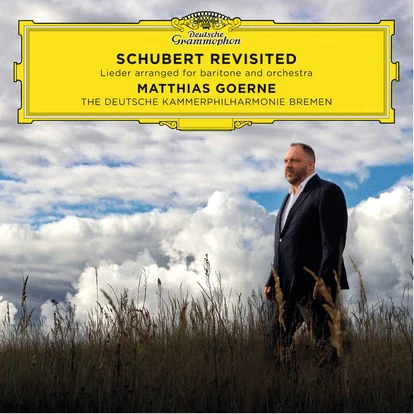Schubert Revisited – Matthias Goerne
Schubert Reimagined: Matthias Goerne and Deutsche Kammerphilharmonie Bremen Paint Expressive Soundscapes
In the realm of classical music, the act of revisiting established compositions can be a fascinating endeavor. “Schubert Revisited,” featuring the masterful collaboration between baritone Matthias Goerne and the Deutsche Kammerphilharmonie Bremen under the orchestrations of pianist Alexander Schmalcz, takes us on a journey that both pays homage to Schubert’s intentions and introduces intriguing contemporary interpretations.
Schmalcz’s orchestrations skillfully navigate the delicate balance between honoring Schubert’s original vision and infusing new shades of emotion. While whispers of Mahler, Wagner, and even Berlioz can be detected, Schmalcz never loses sight of Schubert’s core essence. The orchestrations enrich the emotional landscape, breathing fresh life into familiar melodies. A prime example is the incorporation of a haunting flute that evokes mist drifting across water, enhancing the poignant scene of a lover’s embrace in “Des Fischers Liebesglück.” Similarly, the mournful trombone’s role as Death’s calling card in “Der Tod und das Mädchen” adds a captivating layer of symbolism.
Matthias Goerne’s leadership from the platform is commendable, as he steers the Deutsche Kammerphilharmonie Bremen through Schubert’s intricate musical narratives. In this collection, “Erlkönig” transforms into a chilling one-act opera under Goerne’s deft interpretation. His voice becomes a versatile instrument, adapting to the varied emotional demands of each piece. In “Pilgerweise,” his voice lightens, capturing the essence of a wandering soul traversing the landscape. But it’s in the delicate nuances of pieces like “Abendstern” that Goerne truly shines. He skillfully employs his voice as a canvas, painting vivid imagery with every phrase.
The true allure of Goerne’s artistry lies in the painterly colors he discovers within his voice. The expressive depth he reaches in songs like “Abendstern” resonates profoundly, pulling listeners into the intricate tapestry of emotions that Schubert intended to convey. The closing moments of Alexander Schmalcz’s reimagined version of the song are particularly captivating, marked by an orchestral sigh that lingers in the air, leaving an indelible impression.
“Schubert Revisited” is a testament to the timeless nature of Schubert’s compositions and their ability to transcend eras. Through the collaborative efforts of Matthias Goerne, Alexander Schmalcz, and the Deutsche Kammerphilharmonie Bremen, these songs are not merely revisited, but revitalized, inviting us to experience their beauty anew. This album stands as a reminder that music, when approached with reverence and innovation, can continue to speak to the human soul across generations.

